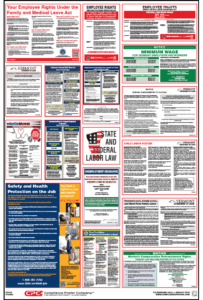 Last summer, the Vermont legislature amended the state’s Fair Employment Practices law to add workplace protections for pregnant employees. The law went into effect on January 1, 2018, and it requires employers to make reasonable job accommodations for women experiencing conditions related to pregnancy or childbirth. The law acknowledges the role of working women in the vitality of Vermont’s economy, most of whom will be pregnant and working at the same time at some point in their lives. Their decision to continue working or leave the workplace altogether during pregnancy or after childbirth may be affected by the availability of even simple job accommodations.
Last summer, the Vermont legislature amended the state’s Fair Employment Practices law to add workplace protections for pregnant employees. The law went into effect on January 1, 2018, and it requires employers to make reasonable job accommodations for women experiencing conditions related to pregnancy or childbirth. The law acknowledges the role of working women in the vitality of Vermont’s economy, most of whom will be pregnant and working at the same time at some point in their lives. Their decision to continue working or leave the workplace altogether during pregnancy or after childbirth may be affected by the availability of even simple job accommodations.
Posting Requirement
As anticipated, the Vermont Department of Labor has released the “Accommodations for Pregnant Employees” workplace posting which is required by the law. The posting explains an employee’s right to reasonable accommodation of pregnancy-related conditions in the workplace. The law defines a “pregnancy-related condition” to mean a limitation of an employee’s ability to perform the functions of a job caused by pregnancy or childbirth or a medical condition related to pregnancy or childbirth. The law does not require that the condition amount to a disability. Even workers with healthy pregnancies may need work adjustments to be made and should be able to request them without fear of reprisal.
Implementing Accommodations and Undue Hardship
The posting suggests that employers work with an employee requesting an accommodation. Although an employer may decline a request for accommodation if it would cause undue hardship, failing to provide an accommodation or retaliating against the employee requesting an accommodation could result in liability. The posting explains that a significantly difficult, unduly expensive or unworkable accommodation creates an undue hardship. Factors to be considered in determining whether an undue hardship is imposed by the requirement that reasonable accommodation be made include the overall size of the employer’s operation with respect to the number of employees, number and type of facilities, and the size of its budget.
Examples of reasonable accommodations that might be provided include:
- More breaks for the bathroom, water or rest
- Access to seating
- Time off for prenatal appointments
- A private, clean space for breast feeding
- Assistance with specific duties, such as lifting
- Time off to recover from medical conditions related to pregnancy and childbirth
Pregnancy Accommodations Moving Forward
Vermont joins numerous other states that have enacted pregnancy accommodation laws communicated to employees by posting a workplace notice. A Better Balance has created a nice survey of state and local laws providing pregnancy protections here. The pregnancy accommodation notice requirement clarifies expectations for both employers and employees, making compliance easier so that pregnancy discrimination complaints and litigation can be avoided. Compliance Poster Company has added the “Accommodations for Pregnant Employees” posting to the 2018 Vermont All-On-One™ Labor Law Poster.

